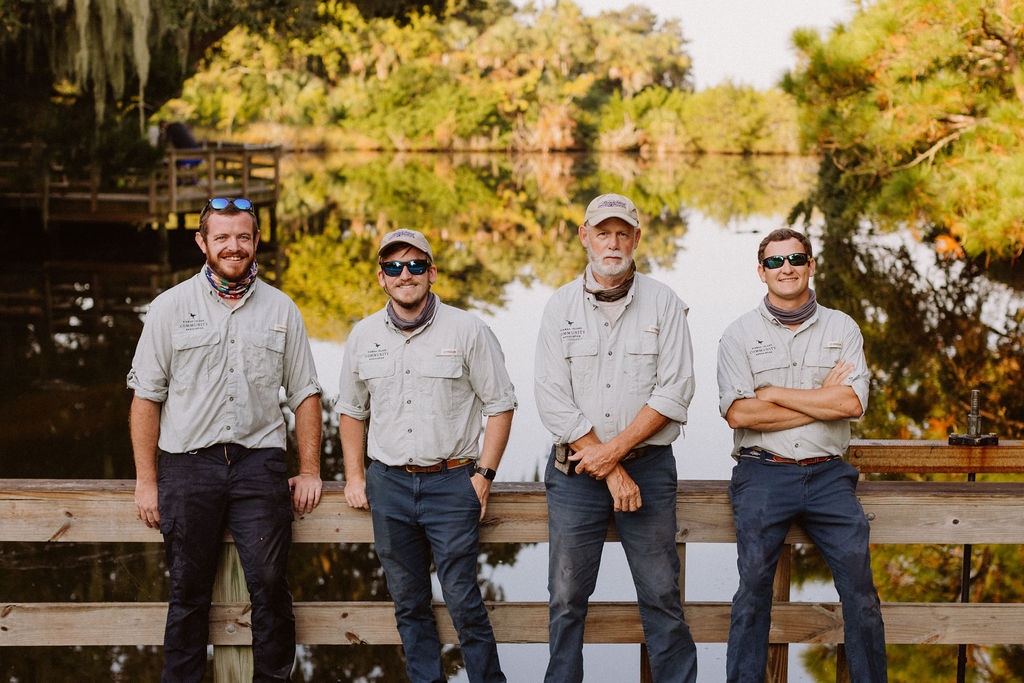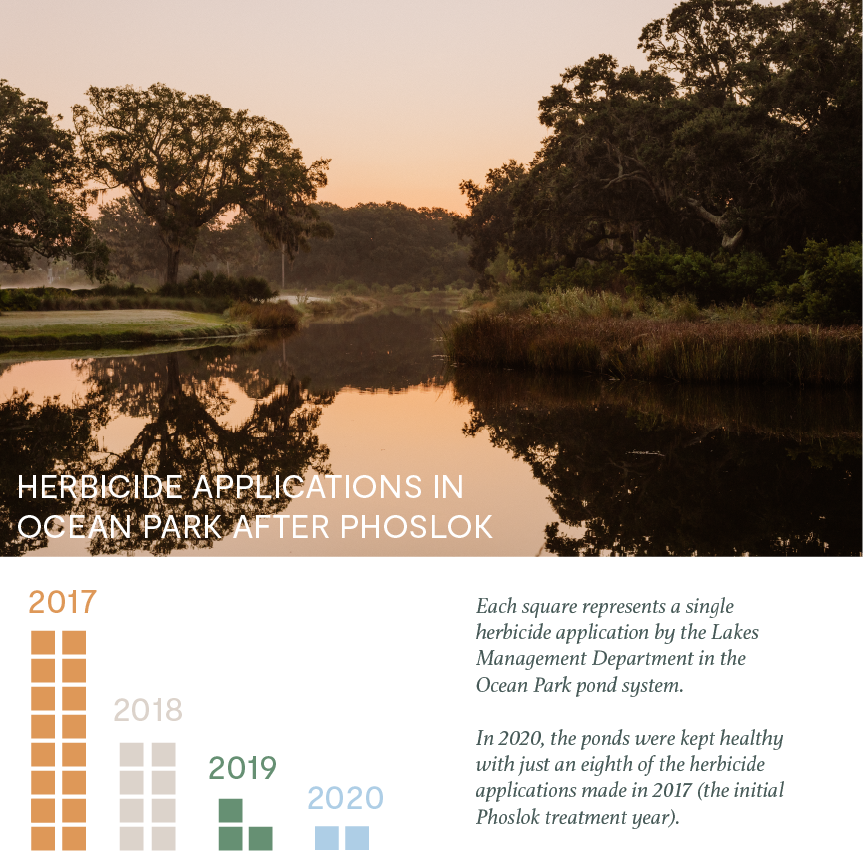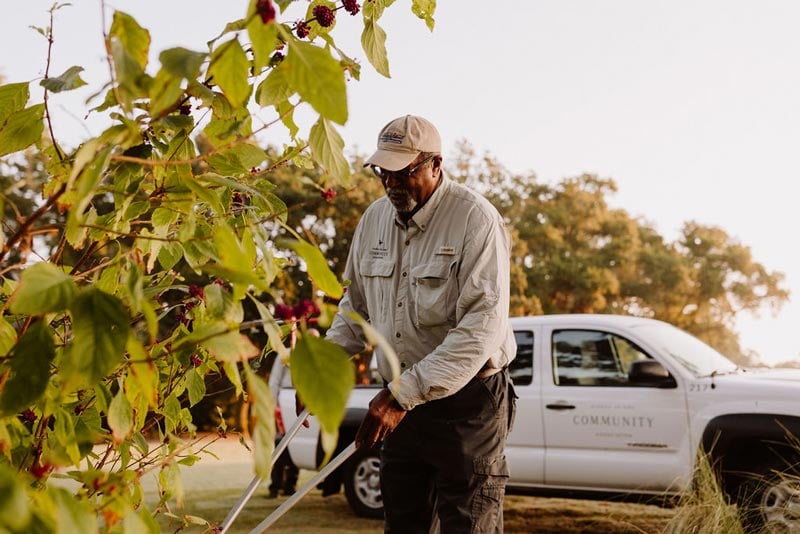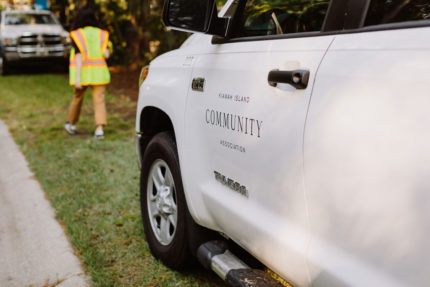Apr
22
2021

From The Blog
Lakes Projects Keeps Kiawah’s Ponds Healthy
RYAN DONNELLY, JAMES WILSON, ROY ROBERTSON, AND MATT HILL MAKE UP KICA’S LAKES DEPARTMENT.
Despite the name, KICA’s Lakes Management Department has a wide variety of responsibilities on the island, including wildlife management (coordinated with the Town of Kiawah Island), mosquito abatement, and maintaining the health of the island’s 122 ponds and the 50 miles of shoreline associated with them. The department is small but mighty, with four team members. Lakes supervisor Matt Hill is a biologist who has been with KICA since 2014, and is particularly well-suited to work on the water. Rumor has it that Matt can identify different species of frogs by their croaking. Ryan Donnelly, James Wilson, and Roy Robertson round out the department, covering day-to-day responsibilities over the entire island.
Island pond management is integral to the larger health of the community. The ponds are both an aesthetic feature for the enjoyment of the community as well as the most important piece in KICA’s stormwater management system. Over the last few years, the Lakes department has been working on several proactive projects that will enhance the health of the overall pond system, as well as some specialized solutions for problem areas.
Stormwater Ponds and Pond Health
As the Lakes department built their management strategy, one factor was a primary consideration: Kiawah’s ponds were constructed to serve as stormwater retention ponds, designed to pass water runoff through KICA’s drainage system and off the island efficiently. That means the ponds are intended to receive roadway and golf course runoff in addition to rainwater and tidal flow.
There are other challenges that are particular to Kiawah’s environment: trees and foliage surrounding the ponds can drop leaves, limbs and other debris into the ponds, clogging drainage pathways. Dense vegetation can also create other unhealthy conditions, blocking sunlight and wind from facilitating an oxygen-rich aquatic environment. Fertilizer in runoff can create ponds that are eutrophic, with an overabundance of nutrients enabling undesirable aquatic growth of algae and surface plants that block sunlight. “Each pond is its own ecosystem — so they have their own problems,” Matt says and the team has to anticipate how each issue might affect the pond’s beneficial bacteria, plants and wildlife, as well as island drainage.
The team tests regularly for water quality, giving them information on the individual health of each of the ponds. Additionally, SC DNR’s algal ecology lab tests water in KICA’s ponds at least once per month (but up to four times per month in the summer growth months). This information gives the team a holistic and individual picture of the ponds’ health, and allows them to respond to conditions in a variety of ways. The team uses chemical (herbicides), mechanical (manual plant removal) and biological (fish, including tilapia and grass carp, feed on algae and other vegetation) controls to keep the ponds healthy and balanced. Matt sums up the water quality work easily. “You have a toolbox; you don’t want just a hammer in it. You can’t manage this system with just one tool.”
The Pond Pruning Project
The pond pruning project, which began in 2019, was planned to limit potential debris which can clog drainage, and open ponds up to sunlight and wind, both of which can positively impact oxygen distribution in the water. While it was clear that nearly all KICA’s ponds would benefit from this treatment, Matt’s plan was to address ponds in the largest drainage basins, the Beachwalker and Canvasback drainage systems, to see the dual effects of improving pond health and positively impacting drainage. The team started with ponds that were on the main artery of island water flow and had been presenting the signs of pond health issues.
This work is done carefully by an experienced arborist, who specializes in lifting canopies and doing proactive trimming in an aesthetically pleasing way. Debris that had already fallen into the pond is removed. Plants and limbs at a 45° angle or less to a pond’s surface (those items that will fall in and become debris in the future) are removed, and the surrounding area is strategically opened to sunlight and airflow.
Sunlight improves pond health by creating the conditions for better oxygenation and helps restore the community of beneficial bacteria to the pond. Airflow reduces stagnation and circulates oxygen throughout the pond, resulting in more efficient breakdown of the leaf debris that does reach the pond. These healthy actions help to prevent several undesirable outcomes: algal growth, insect infestation, and fish kills, among others.
The newly-pruned pond edges not only allow members to enjoy the sight, but it also invites back wading birds, like egrets and herons. Increasing the wildlife benefit is a cascade effect, where more activity equals increasingly healthier ponds.
So far, a total of 31 of KICA’s ponds have been pruned. The project, which is now in its third year, will resume again this fall. Matt’s goal is to get all 122 KICA-managed ponds complete in a 10-year period, after which, he admits, it may be time to start again at the first ponds. However, next time around, the ponds should be in much better condition due to proactive management.
Liming for Balance
In addition to the pond pruning project, the Lakes team recently completed the task of liming the ponds located along Flyway Drive. Lime, which is commonly used in agriculture as well, is finely crushed limestone with a PH in the 8 to 8.5 range.
The Flyway ponds were slightly acidic (a PH of 6 rather than the ideal 7-9 range), with a high amount of phosphates in the water. They were also seeing a lot of blue-green algae growth, which can become toxic. Some of this is our local area: phosphate mining used to take place in the Lowcountry and naturally-occurring phosphates often make their way into the water. Some of it is the specific locations on Kiawah, where runoff brings fertilizer into the ponds, which can cause out of control algal growth. The Lakes team treats this with herbicides in the short term but in the long term, the only solution is to address the water quality issue.
To combat this issue, Matt looked back at a similar issue he’d dealt with before. In 2015, the ponds in Ocean Park were dug, making them Kiawah’s newest ponds. The team was excited to manage these ponds proactively from the very beginning but the ponds weren’t without their issues. In 2017, the team noticed the same consistent issues as the Flyway ponds, and applied a treatment called PhosLok which binds to the phosphates causing the algal overgrowth. It’s not the same product as the lime that is currently being used on the Flyway ponds but it has much of the same action. Below you can see that the Ocean Park treatment reduced the need for herbicides significantly over the four years since the application.

The application of lime not only brings the PH to a more neutral or even basic level, it also acts as a buffer against the PH swings that can result in fish kills and plant deaths. Because they are such small environments, factors like daytime photosynthesis versus nighttime respiration can have an impact on the PH level of a pond. Lime helps the pond to stay at a healthy, consistent level.
Liming helps to improve the water quality in other ways as well. It binds to phosphorus, and takes certain substances, like iron, out of the water. It improves the soil structure and accelerates the decomposition of organic matter, like leaf litter. This, in turn, allows more oxygen to be available for use by beneficial bacterias and fish.
The team will continue monitoring the newly-limed ponds for pond health issues, but they hope that the coming years will see a reduction in the need for chemical application, just like it did in Ocean Park.
The pond ecosystems on Kiawah are complex, and the KICA Lakes Management Department continues to respond proactively to the challenges of the multipurpose, interconnected system. The spring and summer months are times when members often get to enjoy the beauty that these ponds provide on the island, bird-watching or fishing with family on the shoreline. It’s easy to forget that these serene environments are foundational to wildlife and drainage on Kiawah. With a team of experts looking after the details, members can relax and enjoy the experience.

